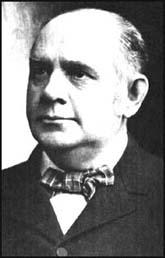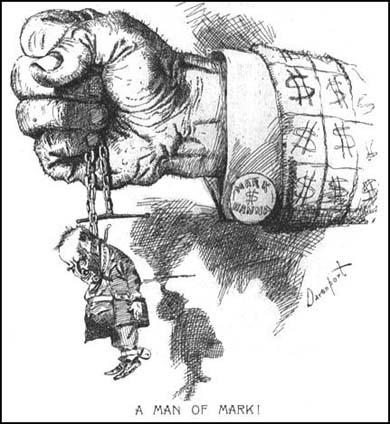Marcus Hanna

Marcus Alonzo Hanna was born in New Lisbon, Ohio, on 24th September, 1837. The family moved to Cleveland where Hanna worked with his father in his grocery business (1853-62) before serving in the Union Army during the Civil War.
After the war Hanna and his father became involved in the coal and iron industry in Cleveland. Hanna later expanded into banking, transportation and publishing. This included establishing the Union National Bank and developing the Cleveland street railway system.
Hanna was a supporter of the Republican Party and was closely associated with the political career of William McKinley, who he helped served two terms as governor of Ohio (1892-96). Both men favoured a policy of high protective tariffs on foreign goods to protect home producers.
When William McKinley was selected by the Republican Party as their candidate in the 1896 presidential election, Hanna helped him raise $3,500,000 for his campaign. This enabled McKinley, to outspend his Democratic candidate, William Jennings Bryan, by 20 to 1.
William Randolph Hearst the owner of the New York Journal and his political cartoonist, Homer Davenport, supported William Jennings Bryan against the Republican candidate, William McKinley. As McKinley had an unblemished record in politics, it was decided to concentrate the attack on Hanna. After the election he produced a drawing, explaining how he had turned Hanna into an image of greed and manipulation.
Hanna's money was used in an advertising campaign that helped to undermine Bryan's political credibility. Hanna, who employed 1,400 people to distribute pamphlets in favour of his candidate, was considered to be instrumental in William McKinley defeating William Jennings Bryan by the electoral vote of 271 to 176.
Hanna's influence over McKinley's victory illustrated the growing influence of wealthy industrialists in American politics. This upset many liberals who favoured William Jennings Bryan and helped inspire what became known as muckraking journalism.
Marcus Alonzo Hanna was elected to the Senate in March 1897. He remained in the Senate until his death on 15th February, 1904.

New York Journal (4th August, 1896)
Primary Sources
(1) Mark Hanna, Socialism and the Labour Unions (1904)
The menace of today, as I view it, is the spread of a spirit of socialism, one of those things which is only half understood and is more or less used to inflame the popular mind against all individual initiative and personal energy, which has been the very essence of American progress. While this spirit of socialism has caused apprehension in some quarters, it has been joyfully received by a certain class of people who do not desire to acquire competence in the ordinary and honest manner and gladly seize any excuse for agitating the public mind on the chance of putting money in their own pockets.
